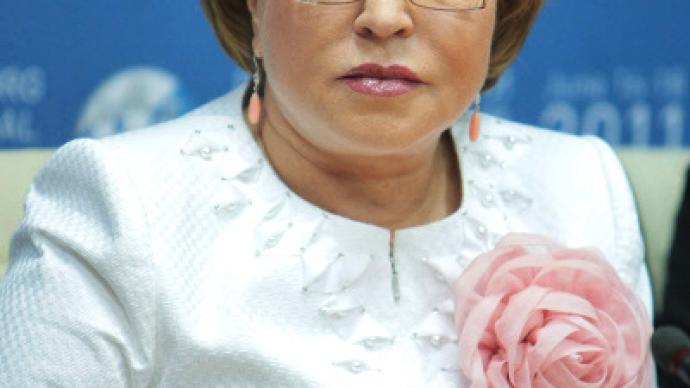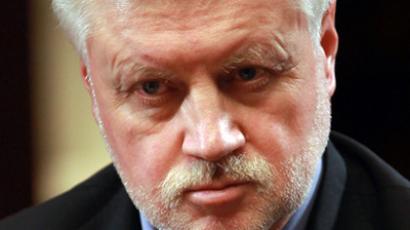St. Petersburg governor bound to become upper house speaker

President Dmitry Medvedev has supported the initiative of several governors to nominate Valentina Matvienko as the speaker of the Federation Council.
The governor of St. Petersburg may become the first woman to occupy the third highest-ranking position in the state. Several regional leaders proposed that Matvienko should be nominated to the post of upper house speaker. The President of the Republic of Bashkortostan Rustem Khamitov voiced his position at a meeting with other heads of state in Gorki, Moscow Region, on Friday. “I like the idea,” Medvedev said. He described Matvienko as a politician who has worked in different government posts and had a wealth of experience. If one of the central posts will be occupied by a woman, this will contribute to efforts to modernize and develop the state, he noted.Khamitov said on behalf of other regional heads that the upper house should be headed by a well-known and experienced politician who “will actively lobby the interests of the regions.” Medvedev asked if the governors wanted one of their peers to head the Federation Council to which Khamitov agreed, saying that everyone knows Matvienko, and “she has considerable experience.” But her ascendency to the post may take some time. In accordance with the law, to head the upper house, Matvienko should first become a deputy of a legislative assembly in a region or a local municipality. The local executive authorities of that legislative assembly must then appoint her to the upper house as the representative of a specific region – in her case it is most likely to be St. Petersburg. Members of the Federation Council will have the final say as they vote on her candidacy once she has been nominated by the house’s council. Matvienko has been the governor of Russia’s second-largest city since she was first elected in 2003. During the last elections to the St. Petersburg Legislative Assembly, she was one of the candidates on the ruling United Russia party’s list, though she stayed in the executive branch after the elections concluded. The procedural legislation for the parliament in St. Petersburg doesn’t provide for the transfer of a council seat from one deputy to another, and Matvienko will not be able to take someone else’s mandate, regardless of who abandoned it. Elections to the Local Assembly will be held in December. The former speaker of the Federation Council, Sergey Mironov, did just this, when he was recalled as St. Petersburg’s representative in the upper house in May. After deputies from the local Legislative Assembly ousted him from the upper house, deputy of the State Duma Yelena Vtorygina, a member of his Fair Russia party, abandoned her seat in his favor. Mironov, who informally leads the opposition party, was recently elected the head of its faction in the lower house. The irony is that while speaker of the upper house, Mironov was fighting to remove Matvienko from her post as governor. Now she is likely to take his former post. Deputies in St. Petersburg said they voted to recall Mironov for his attacks against the governor, for calling St. Petersburg “the most corrupt city” and for breaching agreements with United Russia. Mironov responded by condemning the ruling party for “monopolizing power in the country.” In January, Mironov mirrored the complaints of many St. Petersburg residents as he blasted the city authorities led by Matvienko for their failure to clean snow from roads and ice from roofs. Last month, he told his party branch in St. Petersburg that the main thing is that Matvienko “should not head our city.” Now she can really quit the position, but only to take another, more important one. If Matvienko is appointed to the upper house, she may be elected its speaker by the end of July, Boris Shpigel, a member of the Federation Council, assumed. There are two meetings left until the end of the spring session, and deputies could go into summer recess after voting for their new chair, he told RIA Novosti. Ivan Melnikov, a deputy speaker of the State Duma and the first deputy chairman of the Communist Party, said his colleagues would be ready to work with Matvienko. He recalled that he had successfully cooperated with her when she was the deputy prime minister responsible for social issues. On the other hand, it seems that she “has disappointed” many locals in St. Petersburg while working as governor, he told Itar-Tass. Duma deputy and political scientist Sergey Markov believes that the nomination of Matvienko will be “a joint decision on behalf of President Medvedev and Prime Minister Vladimir Putin.” It is connected with the idea of rotating the leadership in the Federation Council, as well in St. Petersburg. The upper house needs new faces, and the candidacy of Matvienko – who has experience working as an ambassador, deputy prime minister and governor – “is very strong,” he said.














